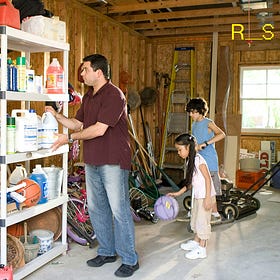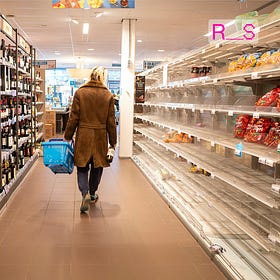I’ve been called a prepper more times over the past few weeks than I have in my entire life…and I want to talk about it.
It’s provoked a strange mix of feelings; on the one hand, it makes me wince. It’s a stigmatized term that evokes tinfoil hats at best and anti-social survivalist militiamen at worst. Though this has changed a little in recent years, the stereotype of such self-righteous doomsday alarmists persists.
On the other hand, it’s earned. I’ve been undertaking a number of different activities that are best understood as prepping—and for reasons I’ll get into, I think you should be doing the same thing.
We need to appropriate, normalize, and broaden the notion of prepping.
I actually think is one of the most important things we can be doing right now—especially those of us on the left.
Audio versions of this Rapid Response can be found here on Substack, Apple Podcasts, and Spotify. If you prefer video, watch on YouTube. Please take a moment to subscribe and share with a friend!
Work-life balance is hard when you’re a futurist. I can’t help but apply my foresight practice in my lived realities. Futures are fundamentally unknowable, but the observable aspects of the present provoke considerable concern about what might be headed our way. I want to foster as much stability for myself and my loved ones as I can.
Community Prepping: Build a Resilient Neighborhood & Thrive in Any Emergency
Key Takeaways - Community prepping builds collective resilience: Moving beyond individual efforts, it transforms neighborhoods into powerful, self-reliant networks capable of sharing resources, …
Odd as it may sound, I believe that prepping is a way for us to recapture some agency and—dare I say it!—even optimism. Prepping may be best known for its paranoid dimensions, but what if we proactively shifted that narrative toward its resilience, hope, and courage? Instead of defaulting to the image of the paranoid loner, what if everyday folks viewed prepping as a means of learning new skills, building genuine community, and practicing bottom-up forms of mutual aid? This feels vital to me.
I say all this having just experienced a pretty serious bout of despair about the state of the world—if you follow this channel, you don’t need me to explain why.
William E. Rees: The Disconnect Between Ecology & The Economy is Driving us Toward Collapse—What Should we do About it? | Urgent Futures #21
Welcome to the Urgent Futures podcast, the show that finds signal in the noise. Each week, I sit down with leading thinkers whose research, concepts, and questions clarify the chaos, from culture to the cosmos.
Sure, it’s possible that miracles could happen and all the volatility we’re witnessing would be resolved tomorrow…but that’s not the bet I’d make at the table. The possibilities that look more likely? That we the U.S. is entering an era open authoritarianism and crony capitalism in which it maybe sparks a multipronged trade war that nobody will win and America will definitely lose—and will perhaps induce an economic recession along the way…or even the dreaded d-word—and maybe torches the world order it established so that select individuals can amass more wealth at the expense of the populace—among other cheery possibilities.
That’s all under the backdrop of the polycrisis, most critically a biosphere that appears to be unraveling faster than previously predicted. Some now believe we’ll eclipse the 1.5°C-above-preindustrial-levels threshold by 2029. Remember, 1.5 isn’t just a number. They don’t say “1.5 to stay alive” for funsies.
I’m a post-growther to my core; I want us to ramp down the demands of the human enterprise. We are in a state of extreme ecological overshoot. We use more than the Earth can sustain. But for a post-growth policy to work and not harm billions of people, it must be done with a high degree of care, planning, and resources in place to address problems as they arise. You don’t have to be a futurist to predict that none of that will happen under the Trump administration. And thus you don’t have to be a futurist to see that the material realities of everyday people, Americans included, are going to deteriorate.
To be clear: that was going to happen regardless under business-as-usual neoliberalism, it’s just happening much faster and more chaotically under Trump. The speed with which change is enacted has real, and sometimes dire, consequences. Remember all the “flatten the curve” discourse early on in the Covid-19 pandemic? I’d say the same applies here. Another dimension of prepping that I like as an adaptive strategy is versatility—knowing how to use what we have and maximize their value (opposed to the “single-use plastic” mode of living).
Ever since Trump got elected, I’ve been developing materials about resilience. This includes a number of pieces here on Reality Studies, as well as forthcoming educational materials such as my crash course, “The Next 30 Days: Resilience Playbook”. A sample of writings you can find right now on RS:
All of the above has entailed pretty extensive research, and my algorithms have observed said research and happily indulged my doomscrolling. I’ve been served dozens of videos over the past few weeks that make direct or indirect claims that we might be headed for major supply-chain breakdowns in the wake of Trump’s tariffs.
The most damning evidence I’ve seen regards U.S. port activity—or more accurately, inactivity. These videos compare current activity to past activity at various ports around the country—or to that of ports around the world—and frankly, the picture is scary. According to these videos, ports in the U.S. have seen fractions of the activity they historically see during equivalent periods in previous years. That’s then echoed by gig workers commenting on the lack of products in stores, or the seeming lack of supplies on the top of the shelves.
Are there reasons why this might not mean what it looks like, or to believe that the Trump administration will realize how bad it’s going to get and reverse course? Sure—absolutely. We’re even seeing little glimmers that Trump is realizing the gravity of the mistake he’s made. The problem is there are more persuasive reasons to believe that the chaos will persist, even if the chaos epicenter du jour shifts from to another domain or topic.
Because we also haven’t even touched the fact that fire and hurricane season are a few months out, and FEMA, NOAA, the National Weather Service, and other agencies designed to understand, mitigate and relieve the impacts of disasters have been gutted. As have many of the regulations on harmful chemicals, water pollution, sewage, and food safety.
What Food Should a Prepper Buy? | 2025 Smart-Storage Guide
Key Takeaways: - Layer Your Supply: Build from a 3-day ready-to-eat kit, expanding to 2-week quick-cook meals, and then long-term bulk staples. - Prioritize Longevity &…
All taken together, I feel confident predicting that we will see some combination of inflation, supply shortages, blackouts, extreme weather events, the spread of disease and/or contamination—and lack the ability to appropriately respond—in the weeks, months, and years to come.
One of the first steps to developing resilience is getting rigorous about your supplies. You can’t just assume that you generally have enough, you have to document what you have and be strategic about what you need. It’s not just about stuffing your bunker, it’s about being diligent enough in your decisionmaking to ensure you have the key resources you need, and to be able to help your loved ones or neighbors if the empty shelves last longer than a couple days, or if you have to “bug in” for an extended period of time. Underlying the supplies are the requisite skills and practices.
Say the calamity magically never comes—now you’ve got goods, skills, and know-how you’ll use at some point in the future.
What Is a Prepper? Meaning, Mindset & Myths Debunked (2025)
Searches for “prepper” have exploded since 2020’s supply-chain shocks and 2025’s rolling blackouts, but the term is still widely misunderstood. Below you’ll find a research-backed unpacking of who preppers are, what they actually do, and how their philosophy differs from hoarding or lone-wolf survivalism.
So, TLDR: I’ve started prepping, and I think you should too. Not in a panicked, run-for-the-hills way, but as a measured attempt to increase your stability at a moment when the macro environment feels increasingly chaotic. Once I started doing this, I felt a higher degree of agency than I had in months. The placebo effect plays a role here, but hey, I prefer that feeling to hopelessness. The phrase that comes to mind is “prepare, not panic.” We can reframe the rough edges of prepping, crafting it as a humanitarian and communitarian effort—a cozier commitment to investing in collective futures.
Back to the here and now. Yes, there is an immediate focus is on supplies, simply because we’re right in the eye of the storm of Trump’s tariff pause, and you just don’t know what will or won’t be available (or will be highly inflated). I’ll include a list of the products I’ve been stocking up on below. But social prepping is arguably the most important part of this. The phrase “we are all we’ve got” has been making the rounds on social media. Like so much on social media, it sounds nice but as far as I can tell isn’t amounting to much practical change, in part because I think a lot of us feel lost.
This post is a brief effort toward the latter, but it has to go wider and deeper than messaging. We need to be doing preparatory social and community work to navigate what happens if, for example, the power goes down as it did in the Iberian peninsula a couple weeks ago. We need to know who we will communicate with and how. Hell, we’ll need to know who we can actually depend on vs. who is a fun friend to hang out with. That, too, is prepping. Call it social prepping.
The Prepper FAQ: Practical Answers to Top Emergency Prep Questions
As promised in the most recent Rapid Response, I present you: the Reality Studies Prepper FAQ, an accessible guide to practical preparedness for newbies and experts alike. This is meant to be a living reference that you come back to when you need a specific question answered; I’ll be continually updating it as I encounter other important questions and t…
I don’t have a punchy ending for this Rapid Response other than to say, yeah, we need to destigmatize the notion of preparing for hardship and start taking it seriously as a set of integrated practices—not as drudgery but as an embrace of the agency we have and our commitment to each other.
I’m working hard to get the crash course published, but that’s probably a few weeks out. There will be more pieces on Reality Studies in the meantime; curious to hear your thoughts in the comments, and otherwise, stay safe and stocked up out there.
Like this piece? Share it with somebody who you think will enjoy it.
Looking for something else? Check out the Reality Studies Post-Growth Primer:
What is Post-Growth Economics? Rethinking Prosperity Beyond GDP Growth
A world in flux. Climate change, biodiversity loss, resource depletion, rising inequality—the litany of 21st-century crises can feel overwhelming, and fast. From record-high atmospheric CO₂ levels to mass extinction trends, evidence abounds that humanity is pushing beyond the planet’s limits. Underpinning many of these ch…























